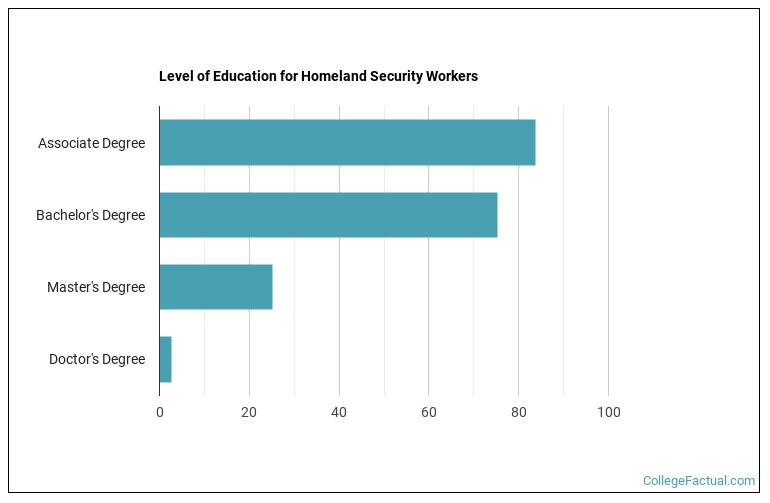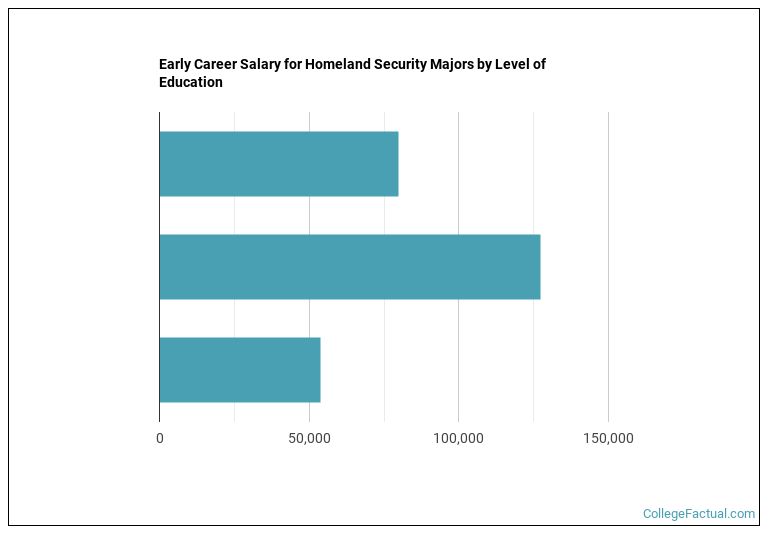 by our College Data Analytics Team
by our College Data Analytics TeamAre you interested in protecting your country from threats of terrorism and protecting fellow citizens during times of crisis? If so, then Homeland Security could be the major for you.
Studying Homeland Security will provide you with knowledge about security threats, both domestic and international. Classes will cover such topics as international relations, homeland defense, government, bioscience, consequence management, and terrorism. Current issues in this field are keeping American interests in mind worldwide, drug trafficking, and emergency management.
Some concentrations you may be able to specialize in are Disaster Management, Critical Infrastructure Protection, and Terrorism and Counterterrorism Operations.
In 2021-2022, homeland security was the 117th most popular major nationwide with 6,812 degrees awarded. This year's Best Homeland Security Schools ranking compares 69 of them to identify the best overall programs in the country. Explore this or one of our many other custom homeland security rankings further below.
This major teaches students many valuable and practical skills. You will learn how to evaluate domestic security challenges and propose changes to government at the local, state, and federal level. This requires a logical thinker who doesn't shy away from controversial topics. Students should be objective and pay close attention to detail in their research in order to have accurate outcomes.
A career in homeland security requires clear thinkers who are able to make decisions and keep calm in emergency situations. You may face any number of dangerous environments. Students should be physical fit and strong as well as emotionally consistent.
New students will need to have completed high school or a GED program and each school will have their own minimum GPA and SAT/ACT test requirements. Specific homeland security careers may require a certain level of degree attainment or additional certifications beyond that.
There are various different levels of homeland security degrees. Homeland Security programs offered by schools range from a to a , which is the highest homeland security degree you can get. Different homeland security degrees vary in how long they take.
| Degree | Credit Requirements | Typical Program Length |
|---|---|---|
| Associate Degree | 60-70 credits | 2 years |
| Bachelor’s Degree | 120 credits | 4 years |
| Master’s Degree | 50-70 credits | 1-3 years |
| Doctorate | Program required coursework including thesis or dissertation | At least 4 years |
A bachelor's degree is the most common level of education achieved by those in careers related to homeland security, with approximately 47.7% of workers getting one. See the the most common levels of education for homeland security workers below.
| Level of Education | Percentage of Workers |
|---|---|
| Bachelor’s Degree | 43.4% |
| Master’s Degree | 17.8% |
| High School Diploma | 10.6% |
| Associate’s Degree (or other 2-year degree) | 9.9% |
| Some College Courses | 6.7% |
75.3% of homeland security workers have at least a bachelor's. See the chart below for the most common degree level workers in homeland security have received.

This of course varies depending on which homeland security career you choose.
Graduates will have learned a broad set of skills they can apply to a number of different occupations. Many grads work for the department of homeland security as federal agents, law enforcement officers or first responders. Other options are to become a law maker, detective, government lawyer or police officer.
Want a job when you graduate with your homeland security degree? Homeland Security careers are expected to grow 8.0% between 2016 and 2026.
The following options are some of the most in-demand careers related to homeland security.
| Occupation Name | Projected Jobs | Expected Growth |
|---|---|---|
| Managers | 1,071,700 | 8.0% |
| Professors | 258,700 | 9.4% |
| Police and Detective Supervisors | 111,600 | 6.6% |
| Protective Service Worker Supervisors | 78,700 | 4.7% |
| Criminal Justice and Law Enforcement Professors | 19,400 | 12.1% |
BS in Criminal Justice - Homeland Security & Counterterrorism
Examine the nature and history of terrorism and how to combat it with this specialized online bachelor's from Southern New Hampshire University.
MS in Criminal Justice - Advanced Counterterrorism
Dive deep into counterterrorism issues, focusing on intelligence analysis, threat assessment and advanced surveillance with this specialized online master's from Southern New Hampshire University.
Recently graduated homeland security students earned an average of $68,089 in <nil>. Earnings can range from as low as $27,387 to as high as $165,273. As you might expect, salaries for homeland security graduates vary depending on the level of education that was acquired.

Salaries for homeland security graduates can vary widely by the occupation you choose as well. The following table shows the top highest paying careers homeland security grads often go into.
| Occupation Name | Median Average Salary |
|---|---|
| Managers | $115,590 |
| Police and Detective Supervisors | $93,100 |
| Emergency Management Directors | $82,570 |
| Professors | $76,990 |
| Criminal Justice and Law Enforcement Professors | $72,390 |
With over 602 different homeland security degree programs to choose from, finding the best fit for you can be a challenge. Fortunately you have come to the right place. We have analyzed all of these schools to come up with hundreds of unbiased homeland security school rankings to help you with this.
One of 4 majors within the Homeland Security, Law Enforcement & Firefighting area of study, Homeland Security has other similar majors worth exploring.
| Major | Annual Graduates |
|---|---|
| Homeland Security | 3,064 |
| Crisis/Emergency/Disaster Management | 2,655 |
| Critical Infrastructure Protection | 628 |
| Other Homeland Security | 267 |
| Terrorism & Counterterrorism Operations | 198 |
| Related Major | Annual Graduates |
|---|---|
| Criminal Justice & Corrections | 109,996 |
| Fire Protection | 13,901 |
| Security Science and Technology | 7,884 |
| Other Homeland Security | 1,612 |